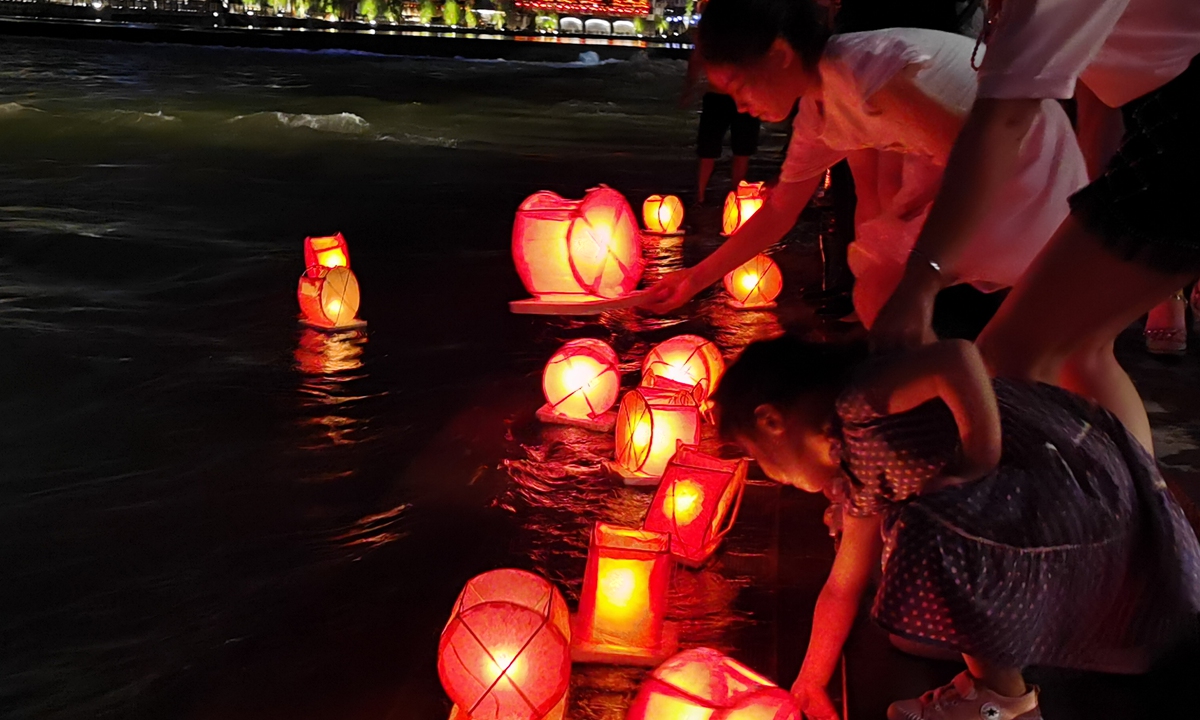
People release river lanterns in East China's Jiangxi Province. Photo: IC
A scene in the recent highly popular Chinese TV drama
The Blooms at Ruyi Pavilion has become a point of contention between netizens in China and South Korea after South Korean viewers accused the show of copying Korean culture, particularly, a traditional Korean lantern festival.
In the scene, the show's heroine sends a lantern with a hand-written wish floating down a river. While this appears rather banal to Chinese audiences as it is a common trope in Chinese costume dramas, some netizens in South Korea expressed they felt infringed upon because, according to them, China had copied the old folk festival known as Yeon Deung Hoe, or Lotus Lantern Festival as well as the Lantern Lighting Festival.
The tradition of lighting lanterns in Korean culture has its roots in Buddhist philosophy that originated to commemorate the birth of the Gautama Buddha. However in China, the cultural tradition of floating a lit lantern along a river is not just used as part of Taoist or Buddhist religious events, but Chinese people also use it to pay tribute to their loved ones who have passed away as well as to bless the living.
"[In China] the history of releasing river lanterns is relatively long. It can be traced back to before the Spring and Autumn Period [770BC-476BC], and became more connected with Buddhism during the Northern and Southern Dynasty [386-589]. The source of its origins is relatively diversified. The river lantern is also commonly seen during the traditional Zhongyuan Festival and it also has religious roots," explained Zhang Yiwu, a professor at Peking University, told the Global Times on Thursday.
While the issue continued to ferment, according to the Yonhap News Agency on Tuesday, the Cultural Heritage Administration of Korea announced that the "Lantern Lighting Festival in the Republic of Korea," which the South Korean government applied to be added to UNESCO's Intangible Cultural Heritage of Humanity list in 2018, had been recommended for approval by UNESCO's Intergovernmental Committee for the Safeguarding of the Intangible Cultural Heritage.
Whether or not the festival is going to be culturally exclusive to South Korea will be revealed at UNESCO's 15th meeting of the Intangible Heritage Committee at its headquarter from December 14 to 19, reported the Yonhap News Agency.
The news about South Korean netizens' accusations and the UNESCO application quickly ignited discussions on China's Twitter-like Sina Weibo. Despite general anger and comments such as "It is shameless," some netizens were of the opinion the focus should be on China's own river lantern tradition rather than South Korean netizens' ignorance concerning East Asia's shared cultural traditions.
"There was a poem written by the Qing Dynasty [1644-1911] Qianlong Emperor called 'View the River Lantern during the Zhongyuan Festival.'" one netizen commented on Sina Weibo.
"An old Chinese costume drama with a river lantern that I have seen was the 1980s' The Sword and the Song," wrote another.
"It is so blind and funny that they think a lot of shared East Asian things only belong to them," posted another.
"Many cultural traditions in China and [South] Korea are highly consistent as Korean culture was influenced by Chinese culture. Later, it developed to include more local content, so it would have its own evolution and development in its own country," Zhang noted when explaining the cultural links between Chinese and Korean traditions.
Some other netizens emphasized the back-and-forth disputes between China and South Korea about cultural plagiarism.
"Again and again, from saying they own the Dragon Boat Festival and to the recent incident saying China copied the Korean Hanbok [clothing]. It is the perfect example of the idea that when you lack something, you try really hard to steal it," noted another.
"[South Korea] applying for the Lantern Lighting Festival does not prevent the continuation of or the application of [China's river lantern tradition]. Different cultures have different cultural connotations," Zhang emphasized.




